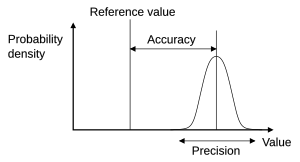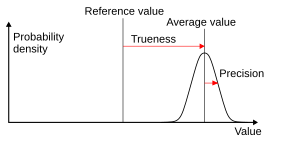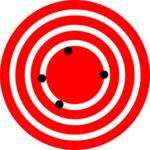Accuracy and precision facts for kids
Accuracy and precision are important ideas in science and everyday life! They help us understand how good our measurements are.
Accuracy is how close your measurement is to the real, true value. Imagine you're trying to hit a target with a dart. If your dart lands right in the bullseye, that's accurate!
Precision is how close your measurements are to each other, even if they aren't close to the true value. If you throw three darts and they all land very close together, but far from the bullseye, that's precise but not accurate.
Think of it like this:
- If you measure your height and get 150 cm, and your true height is 150.1 cm, your measurement is very accurate.
- If you measure your height three times and get 150 cm, 150.1 cm, and 150.05 cm, your measurements are very precise because they are all very close to each other.
Sometimes, a measurement can be accurate but not precise, or precise but not accurate. The best measurements are both!
Contents
Understanding Accuracy and Precision
In science and engineering, when we talk about a measurement system, accuracy means how close the measurements are to the true value of what's being measured. Precision means how close repeated measurements are to each other, even if you do them many times under the same conditions.
It's important to know the difference because they help us understand different kinds of errors:
- Precision is about random errors. These are small, unpredictable differences that happen each time you measure.
- Accuracy is about systematic errors. These are consistent errors that always push your measurement in the same direction, making it consistently off from the true value.
For example, if you use a ruler that is slightly too short, all your measurements will be a little bit off. That's a systematic error, and it affects your accuracy. If your hand shakes a little when you measure, that's a random error, and it affects your precision.
A good measurement system should be both accurate and precise. This means your measurements are close to the true value and also very close to each other when you repeat them.
How We Show Accuracy and Precision
Scientists and engineers often show how accurate or precise a measurement is by using significant figures. These are the important digits in a number that tell you how exact the measurement is.
For example:
- If you write 843.6 meters, it means the measurement is precise down to the tenths place (0.1 meters). The actual value is probably between 843.55 m and 843.65 m.
- If you write 843 meters, it means the measurement is precise down to the units place (1 meter). The actual value is probably between 842.5 m and 843.5 m.
Sometimes, numbers with zeros at the end can be tricky. For instance, 8,000 meters could mean it's precise to the nearest meter, or just to the nearest thousand meters. To avoid confusion, scientists often use scientific notation. For example, 8.0 x 103 meters clearly shows that the measurement is precise to the nearest hundred meters.
Different Kinds of Precision
Precision can be broken down into two main types:
- Repeatability: This is how much your measurements vary when you try to keep everything the same. You use the same tools, the same person measuring, and you do it all within a short time.
- Reproducibility: This is how much your measurements vary when you change things like the tools or the people doing the measuring, or when you measure over a longer time.
If your measurements are repeatable, it means you can get very similar results when you do the same thing over and over. If they are reproducible, it means other people, using different equipment, can also get similar results.
- Accuracy of a target grouping according to BIPM and ISO 5725
Accuracy in Different Fields
The ideas of accuracy and precision are used in many different areas:
In Psychometrics
In fields like psychology, accuracy is sometimes called validity. This means how well a test or measurement actually measures what it's supposed to measure. Precision is sometimes called reliability, which means how consistent the test results are if you take it multiple times.
In Information Systems
When we talk about things like search engines or databases, accuracy can mean how many of the results found are actually correct or relevant. For example, if you search for "dogs" and the search engine shows you only pictures of dogs, that's accurate.
See also
 In Spanish: Precisión y exactitud para niños
In Spanish: Precisión y exactitud para niños
 | Audre Lorde |
 | John Berry Meachum |
 | Ferdinand Lee Barnett |





